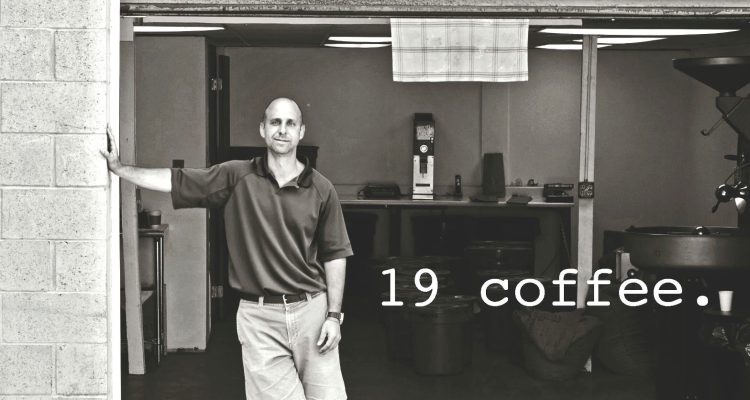Editor’s note: Wheeling has cultivated a number of men and women who are outstanding in their chosen fields — the arts, science, medicine, etc. Today, Weelunk features David DiOrio, a graduate of The Linsly School who traded the white-collar work world for the perfectly roasted coffee bean.
There is a reason the building has no sign. They don’t serve coffee. They do something much more important. They roast it to perfection.
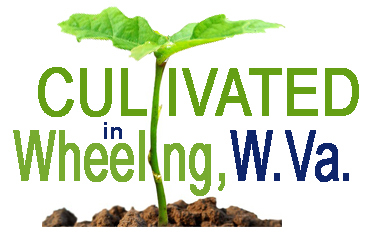 I approach the garage door and walk directly into the heart of the operation. A young man at the roaster picks his head up and greets me. In the back of the room, an orange head of hair whips around to present a familiar smiling face — Jessica Link. It is the same smiling face that greeted Second Cup Café customers in North Wheeling for many years. She and her sister Amanda Kuri were proprietors of the wonderful coffee shop that was a little ahead of its time.
I approach the garage door and walk directly into the heart of the operation. A young man at the roaster picks his head up and greets me. In the back of the room, an orange head of hair whips around to present a familiar smiling face — Jessica Link. It is the same smiling face that greeted Second Cup Café customers in North Wheeling for many years. She and her sister Amanda Kuri were proprietors of the wonderful coffee shop that was a little ahead of its time.
Nick Eplin, the roaster, hustles me past dozens of plastic tubs, each adorned with a large label denoting the country of origin. Jessica hops back to weighing coffee. I quickly meet David’s wife Ellen; she is consumed with the office’s accounting for the morning.
David pops out of his office and pulls me in. It’s a spartan office; work papers are tacked across the baby-blue walls. The only personal embellishments are a couple of pictures of Pittsburgh Pirate great Roberto Clemente.
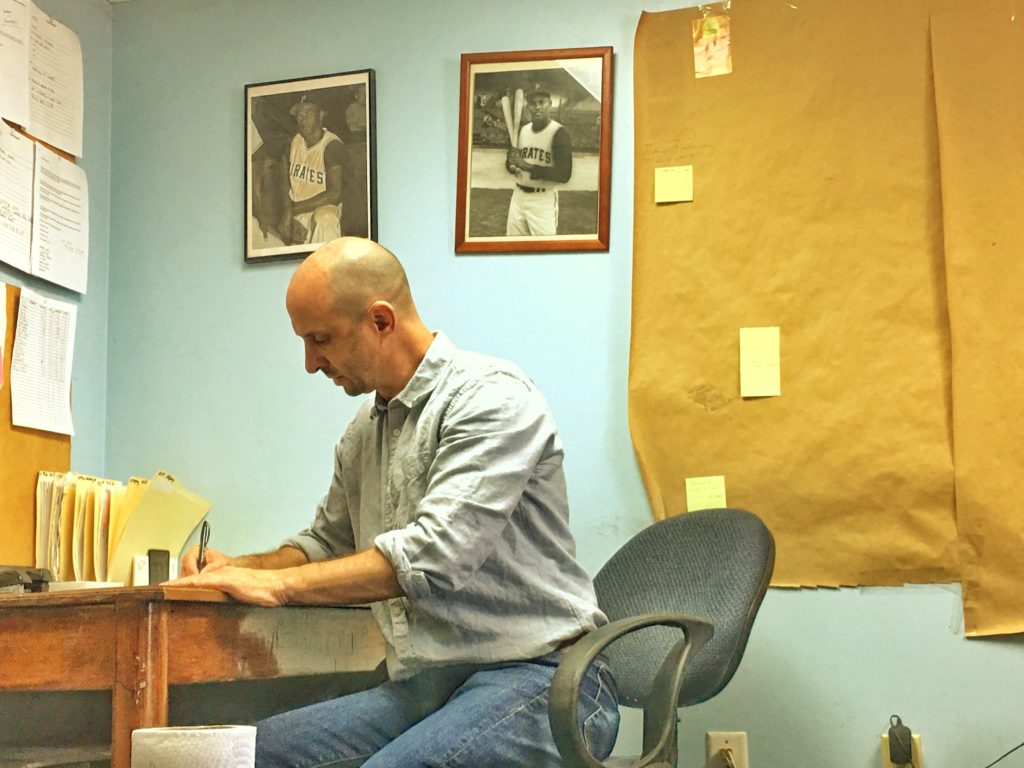
As David finishes signing a few slips of paper, there is a quiet knock at the door, and Nick reappears with two cups of Rwanda peaberry pour-over.
David begins to spin a life-story full of unexpected gifts and deliberate course corrections.
THE HEADMASTER’S SON
At age 12, David found himself in the “Big City” of Wheeling. His father, Reno, had accepted the position of headmaster at The Linsly School. They left the tiny hamlet of Saltsburg, Pennsylvania, where Reno worked at Kiski Prep.
“It is a unique way to grow up, as the child of a headmaster,” David jokes. He attests growing up on the Linsly campus was a great environment for a young boy to thrive. “It was idyllic. We played sports, we fished, we ran the creek. We always had plenty to do.” David says he had no lack of friends upon moving to Wheeling, both new friends and old friends.
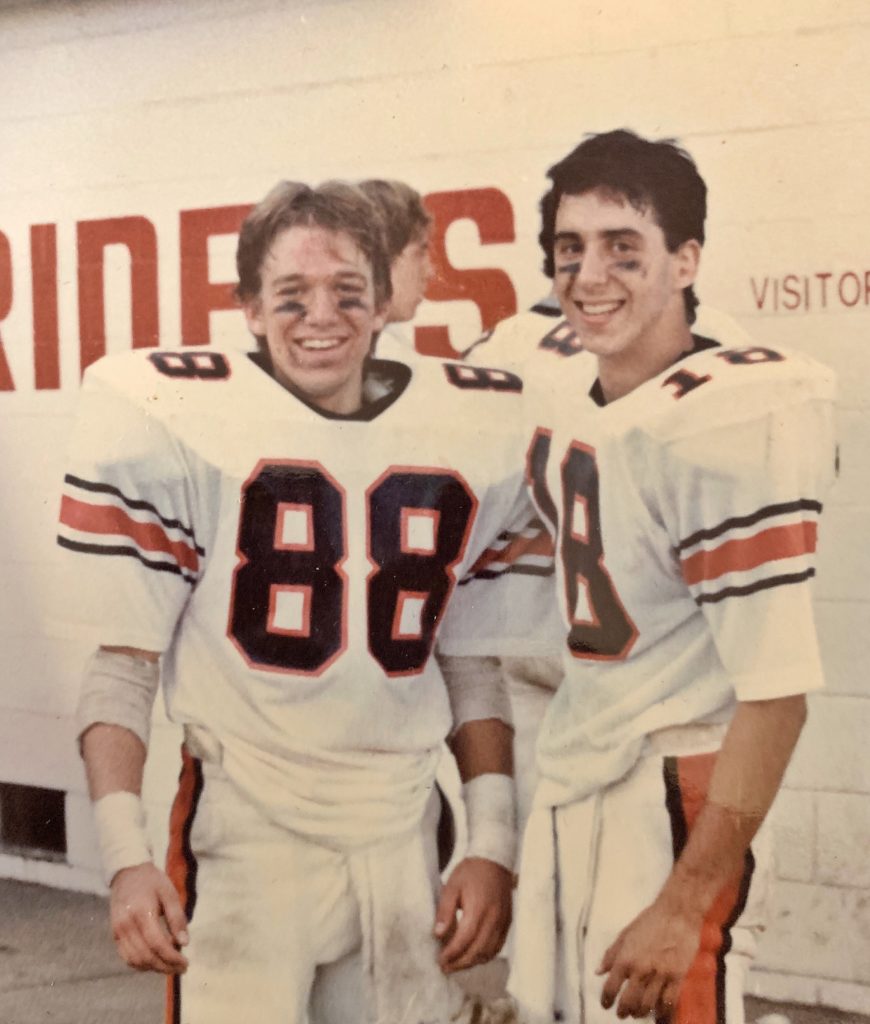
Not long after he came to Wheeling, David’s best friend, Mark Landini, joined him as a Cadet. DiOrio says they were inseparable.“Mark lived in the dorm, but on Friday evenings, he signed out of the dorm and came to Headmaster’s House for the weekend, just about every weekend.” The two remain close friends, and Landini continues to spend almost every day on the Linsly campus working in the school’s development office.
Moving to Wheeling was a huge change for DiOrio. He can remember being intimidated crossing National Road at Route 88, getting from Rax — now Tim Horton’s — to Baskin-Robbins, where Sheetz is located now.
“Saltsburg was a thousand people, tops. There weren’t any major intersections and cars whipping by; navigating Wheeling on foot was a tad nerve-wracking at 12 years old,” David recalls.
As he has moved around the country for work, David has come to appreciate Wheeling for its size, its smallness. It’s the small-town culture that shapes his passion for what he terms his life’s calling, roasting coffee. He attributes his success in the coffee business to the value he places on personal relationships.
“The coffee business is really about connecting with people,” he says. “So much human bonding takes place over a great cup of coffee.”
The appreciation and aptitude for connecting people is a familial trait — one inherited from his father. “Perhaps my greatest joy these last few years is watching David create his own network of contacts and connecting people through coffee. He enjoys it in the same way I have enjoyed connecting Linsly grads of different generations over the years,” the elder DiOrio says.
David’s connection to place and people is evident as he has regular customers who sneak in the open garage door while they are roasting, looking for a fresh batch of beans. These are often Wheelingites who are passing through “Little” Washington for the day. They stop to say hi, grab a pound or two of coffee, and most insist that David let them make the Wheeling deliveries for that week, which he typically declines.
However, David insists that the semi-retired headmaster excels at his occasional delivery route. “I think Dad likes making the coffee run simply because it gives him one more reason to stop in Good Mansion.”
FOR BETTER OR WORSE
In 2001, David left his white-collar office job and walked through the front door of his new home and told his wife he was done at Ansoft, a Pittsburgh-based software development company.
“After four years, I just couldn’t sit behind a desk any longer,” says DiOrio.
In prior years, he had done a variety of work around the country, worked in health care, in management at a national tire company and even spent time in the family business — teaching. He majored in English at Dickinson College and, after all, his father, mother, brothers, aunts and uncles were teachers.
Teaching led him to a brief work stint in Wheeling, spending his mornings at a desk at the Wheeling News-Register and afternoons teaching at Linsly. Teaching also took him full circle back to Kiski Prep.
He eventually made the jump to Pittsburgh, following his then-girlfriend Ellen Jones. Ellen, also a Wheeling native, had taken a job in the city. David worked in marketing at the Carnegie Museums and later found himself behind a desk at Ansoft. Four years of managing external marketing and investor relations for the growing tech company had left David unfulfilled. He was determined to walk away without any prospects of other employment.
His timing wasn’t optimal as he and Ellen had recently married and bought a house. David recalls Ellen jokingly saying, “I think I said for better or worse, but you are truly testing the ‘worse’ early on.”
Looking back, Ellen says she never doubted he would move onto something that better fit his skills and personality. “He has always been so good with people, and he has an amazing ability to tell a story. I knew he would find what he wanted.”
She just never banked on coffee.
THE MOST OVER-QUALIFIED FLOOR SWEEPER
David wasn’t sure where he was headed, but he did what smart people do: he mined his network. A friend of a friend connected him with the owner of a successful Pittsburgh coffee roaster, La Prima. David knew as a coffee supplier, the owner was engaged with a variety of businesses throughout the region. He hoped the owner would help him make a move that was in line with his background. David never expected what would happen next.
“The owner said, ‘I am down a person. Would you want to come help out? You would be the most overqualified floor sweeper and coffee-packer I have ever had, but it will get you out of the house and give you some pocket money.'”
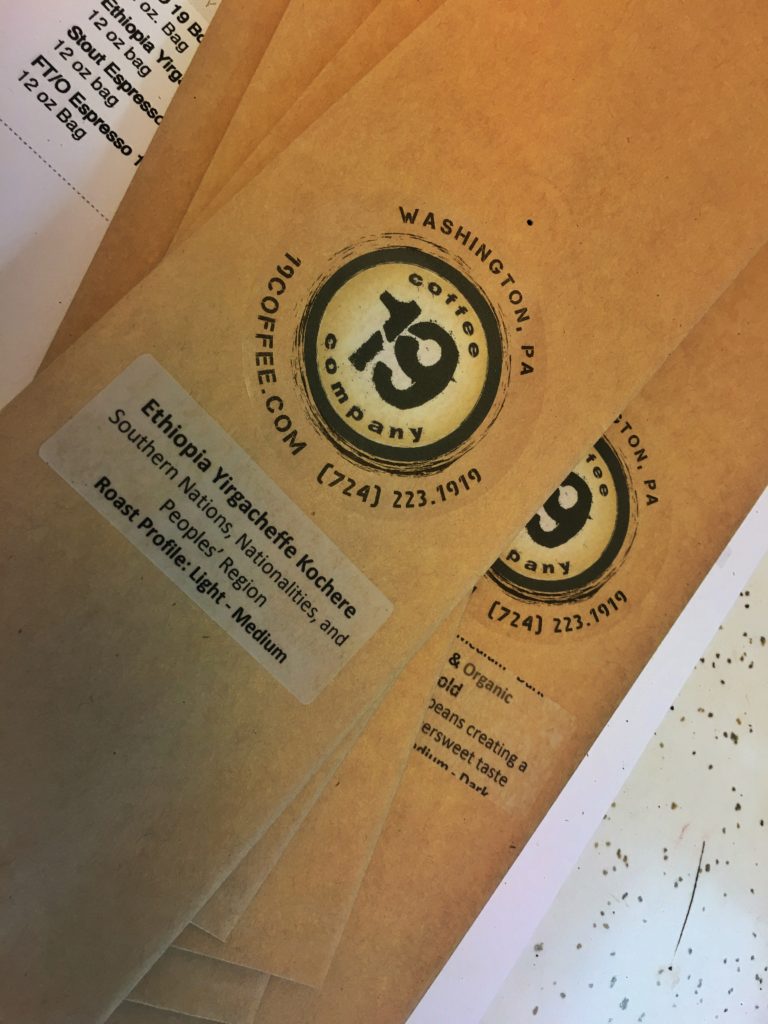
In short order, David discovered, “this is what I am supposed to do.” It all clicked. Working there took him back to his first cup of amazing coffee at a little shop in Washington, D.C., while working for the tire company, some 20 years earlier. The hands-on work and the personal relationships in Pittsburgh’s Strip District captivated him. He spent 10 years at La Prima learning every aspect of the business. At 10 years, it was time for him to move on, time for him to take what he learned and turn it into something of his very own.
In the heart of the Great Recession, 19 Coffee was born. The timing of the start-up presented some risks, but for him, it was the right time. Like many small business owners, he is filled with stories of sacrifice and struggle. He, Ellen and the kids all survived.
It’s a family business — David oversees roasting and customer relations. Ellen describes herself as “the catchall, I do a little bit of everything,” and their two daughters lend a hand when needed. They fill in the rest of the staff with a full-time roaster, packer and delivery driver.
YOU MUST HATE STARBUCKS
It’s a question he gets asked repeatedly by customers. “No, no, I love Starbucks,” insists DiOrio. “I may not be a fan of their coffee and some of the business practices they employ, but Starbucks created the landscape that allows my business to exist.” DiOrio believes Starbucks taught middle America to appreciate specialty coffees, diverse roasting profiles and gave some semblance of understanding that coffee from specific regions simply tastes different.
In the French lexicon, the term terroir describes “specificity of place” as it pertains to grapes and ultimately wine. The soil, sunlight, topography and, more importantly, the daily weather of a growing season is what gives grapes their character. Coffee is no different.
It’s the terroir that enchants DiOrio. 19 Coffee focuses on lighter roasting profiles of single origin beans, meaning 100 percent of the beans in a roasting batch comes from the same region of a country and often from the same farm.
THE HOLY TRINITY OF COFFEE: FARMER, ROASTER, BARISTA
Have you ever had a cup of coffee that just knocked your socks off?
DiOrio assures it isn’t a happy accident. It is the result of a great deal of conscientious work by numerous people in a long supply chain that begins thousands of miles from your favorite coffee shop.
“If we (the roaster) have been given really good beans, then it’s our job not to screw them up. We owe it to the farmers.”
The farmers have the riskiest and most physically demanding job in this trinity. It is a lot of time caring for plants that thrive in a fragile landscape. Farmers toil in the shadow of Big Coffee: corporate plantations and their supply chains. There is also the threat of natural disasters and the rise of “coffee rust,” a devastating fungus that can cripple a susceptible coffee farm.
DiOrio’s commitment to small coffee farms is punctuated by his involvement in local coffee cooperatives that connect coffee growers in remote regions to coffee consumers in greater Pittsburgh and West Virginia. 19 Coffee is the exclusive roaster for Building New Hope, a volunteer-driven non-profit organization based in Pittsburgh and Nicaragua. He also works exclusively with Firsthand Coffee, a social enterprise project based at West Virginia University.
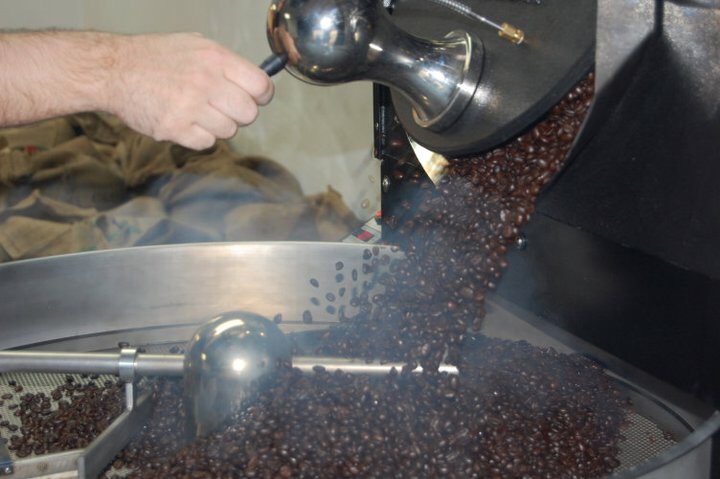
“David is the backbone of our operation in West Virginia,” says Amanda Marple, Firsthand general manager. “Having a local, dependable roaster has really allowed us to grow our operation.” Marple adds that David has such devotion to the coffee growers often putting their needs and the needs of Firsthand above the needs of his own business.
Once a great roast is achieved, the bean moves onto the barista. According to DiOrio, the barista has the final, most difficult task. The pressure is on them to prepare the coffee, a task that requires them to destroy the work done before them by grinding the bean. Months and months of work get compressed. A barista has about three minutes to perfect your coffee.
For DiOrio, the best barista in the Greater Pittsburgh area is Tommy Medely, owner of The White Rabbit in Greensburg, Pennsylvania. “He is a phenomenal barista; he is as good as anyone I know doing what he does.”
Medely has operated The White Rabbit for about 17 years and has worked off and on in shops since college, attracted to the intellectual nature of cafes.
“No amount of training can make a person appreciate coffee; it takes a natural curiosity to make a great coffee,” says Medely.
It’s why he loves DiOrio’s coffee.
“From his days at La Prima, you could just tell this guy was obsessed with the specifics. His care for the farmers and his roasting process is why we love 19 Coffee. We serve other roasters, but 19 Coffee is the trunk of what we offer,” Medely says with a tone of affection.
THE FUTURE OF (19) COFFEE
On the horizon for 19 Coffee is a new location. David has put together a seasoned staff, and the business is growing out of their “under-the-overpass” building. The space has served them well, allowing them to stay under the radar, while being in the center of their market.
David is mum on whether they will stay in Washington County or move closer to Pittsburgh. One thing is certain — he plans to operate the facility on alternative energy as much as possible. “We are definitely going to invest in solar as part of our move and expansion,” he says. “Climate change is a serious threat to the future of our business, and we feel obligated to be an example of a responsible roaster.”
The most sought-after coffees are grown in countries huddled around the equator. The climate of these mountainous regions is fickle, and changes to microclimates are already having an impact on the coffee world.
A recent Public Radio International story estimates that coffee exports in El Salvador, in Central America, have fallen by more than half in the last decade citing shifts in the microclimate of the region. It is estimated that 80,000 jobs in the El Salvador coffee fields were lost during that same 10-year period.
All of this concerns DiOrio as he looks to grow his business. It is a primary reason he focuses on “direct trade” with small coffee farms around the world. It is the best way for him to manage risk as the coffee world evolves.
WHERE CAN YOU FIND 19 COFFEE?
As David ponders his move to a new location, he assures that a retail coffee shop isn’t on the horizon. “Maybe the girls will open a coffee shop someday,” he said, referring to his young daughters. “Perhaps that’s how they will want to grow the business.” For now, David DiOrio is perfectly happy roasting unique batches of the best small-farm coffee you will find in Greater Pittsburgh.
19 Coffee is served in Wheeling at Good Mansion Wines, Later Gator, Nicky’s Garden Center, and Sarah’s on Main. Coffee can also be ordered from their website, 19Coffee.com, and shipped to your home or business. If you want to serve 19 Coffee in your restaurant or business, give David a call at 724-223-1919.


